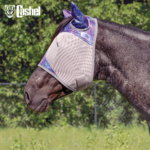Almost every year, sometime in late summer, the newspapers report the death of a local horse from a mosquito-borne encephalitis. In my area, generally it is Eastern equine encephalitis (EEE), occasionally it is West Nile virus (WNV).

There will be an interview with the distraught family. “This was the yearling we had such great plans for.” “He was the gelding my daughter showed to a state championship.” “This filly was to be our foundation mare.” The stories are heart-wrenching. You know how devastated they are and you share in the upset of the family.
But when emotions have cooled, you have to ask “Why?” If these people had the finances to show their horses or the extra cash to consider going into the horse-breeding business (never for the faint of heart nor short of cash), why, oh why, didn’t they invest in basic preventive health care for those horses?
Yes, veterinary care costs money. But the cost of a vaccine is miniscule compared to the cost of treating a sick horse and then dealing with his death. And honestly, financial cost may seem like nothing compared to emotional loss and costs. If you are coaxing along a beloved bloodline, you may have just lost your best and last breeding prospect. If your grandchildren love riding Smoky, it will be difficult to explain why he is gone.
There are ways to minimize costs for preventive care (See “Budget Crunching,” April 2013). Organize a preventive health-care day within your barn or with neighbors. Most veterinarians will split the farm call charge and possibly offer discounts for such an arrangement. Splitting a 10-dose tank of vaccine is generally less expensive than individual vaccines but strict sterility must be observed. If you have horses who come due for vaccination boosters at different times, talk to your veterinarian about purchasing vaccines to give yourself.
Look at your budget with a critical eye. Is that one extra show day worth the risk of a deadly disease that could have been prevented with a vaccination? Entry fees aren’t cheap, and your horse could care less if he misses a show or two. A show day is much more than just entry fees, of course. Gas for travel, upkeep on your truck and trailer, and the cost of equipment you need to show are all big expenses.
Years ago when I was in veterinary college, we got in a top show horse with tetanus. This horse was a World Champion—stunning horse and also a nice horse. Since he was a stallion, his owners were willing to go the full mile to treat him. He did survive—never to return to his previous state of health—but he was alive and capable of breeding mares. Not very many horses survive tetanus—partly due to the long and costly treatment.
The bill for his care was astronomical. We had to build a “quiet stall” to reduce any stimulation, plus provide round-the-clock observation to keep him calm and deliver his medications. The back-story here? He had not had a tetanus booster in years. He was so busy out on the show circuit that his owners forgot about basic care. Cost was not a factor in this case, but priorities were.
So, right now, look through your horses’ records. Are any of them due for basic preventive health care? If so, look at your horse budget and start shifting money around. The important core vaccines (see January 2012) need to be given to EVERY horse. The non-core vaccines can be adjusted as needed for an individual horse and his lifestyle. Don’t let your horse become the “sentinel case” for a preventable, usually fatal disease.
Deb Eldredge, DVM, Contributing Veterinary Editor





